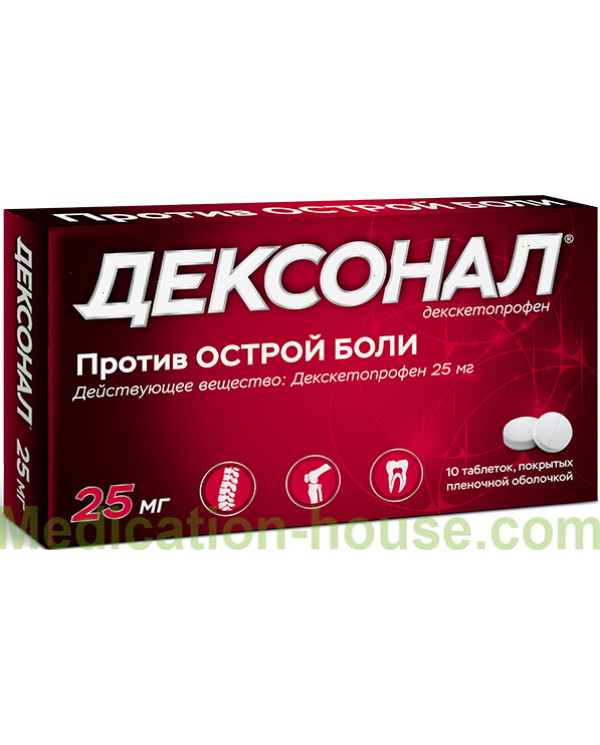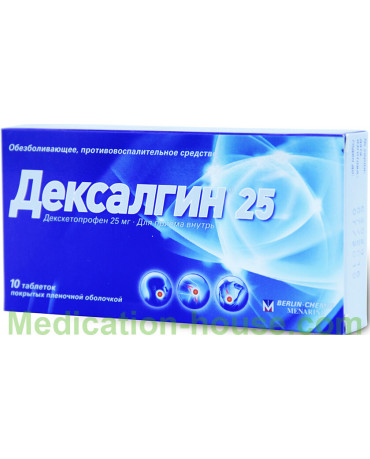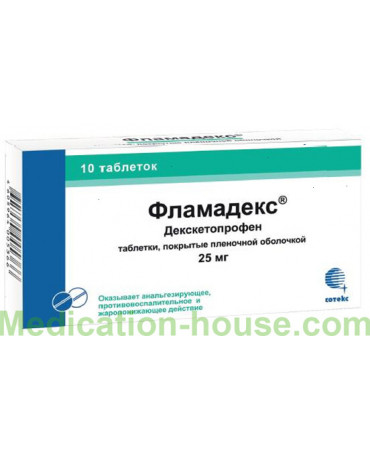User manual for Dexonal
You can buy Dexonal here
Indications
Musculoskeletal pain (mild or moderately severe), algomenorrhea, toothache.
The drug is intended for symptomatic treatment, reduction of pain and inflammation at the time of use.
Contraindications
- hypersensitivity to dexketoprofen, other components of Dexonal and other NSAIDs;
- a complete or incomplete combination of asthma, recurrent nasal polyposis and paranasal sinuses and intolerance to acetylsalicylic acid or other NSAIDs (including in history);
- erosive and ulcerative lesions of the gastrointestinal tract in the acute stage;
- gastrointestinal bleeding or perforation in history, including those associated with previous use of NSAIDs;
- gastrointestinal bleeding; other active bleeding (including suspected intracranial hemorrhage);
- inflammatory bowel disease (Crohn's disease, ulcerative colitis) in the acute stage;
- severe liver failure (10-15 points on the Child-Pugh scale);
- progressive kidney disease, confirmed hyperkalemia;
- chronic kidney disease: stage 3a (glomerular filtration rate (GFR) 45–59 ml / min / 1.73 m2), 3b (GFR 30–44 ml / min / 1.73 m2) and 4 (GFR <30 ml / min / 1.73 m2);
- the period after coronary artery bypass surgery;
- severe heart failure (NYHA class III-IV class);
- hemorrhagic diathesis and other disorders of blood coagulation;
- age up to 18 years (due to the lack of data on efficacy and safety);
- pregnancy and breastfeeding period.
Carefully
Peptic ulcer and duodenal ulcer, ulcerative colitis, Crohn's disease, history of liver disease, hepatic porphyria, chronic kidney disease, stage 2 (GFR 60-89 ml / min / 1.73 m2), chronic heart failure, arterial hypertension, significant decrease in circulating blood volume (including after surgery), elderly patients over 65 years old (including receiving diuretics, weakened patients and patients with low body weight), bronchial asthma, simultaneous intake of glucocorticosteroids (including after prednisolone), anticoagulants (including warfarin), antiplatelet agents (including acetylsalicylic acid, clopidogrel), selective serotonin reuptake inhibitors (including citalopram, fluoxetine, paroxetine, sertralin), ischemic heart disease, cerebromasc. dyslipidemia / hyperlipidemia, diabetes mellitus, peripheral arterial disease, smoking, Helicobacter pylori infection, systemic lupus erythematosus (SLE) and other systemic connective tissue diseases, prolonged use of non-sterile oid anti-inflammatory drugs, tuberculosis, severe osteoporosis, alcoholism, severe somatic diseases.
Pregnancy and lactation
Use of the drug Dexonal at pregnancy and during breastfeeding is contraindicated.
Composition
Active substance: dexketoprofen.
Release form: tablets, film coated 25 mg №10.
Mode of application
Dexonal is taken orally with food. Simultaneous food intake slows down the absorption of dexketoprofen, therefore, in case of acute pain, it is recommended to use Dexonal at least 30 minutes before a meal.
Depending on the intensity of the pain syndrome, the recommended dose for adults is 12.5 mg of dexketoprofen (1/2 Dexonal tablet) every 4-6 hours or 25 mg of dexketoprofen (1 Dexonal tablet) every 8 hours.
The maximum daily dose is 75 mg.
Dexonal is not intended for long-term therapy, the course of drug treatment should not exceed 3-5 days.
Patients 65 years and older
Elderly patients should take Dexonal, starting with the minimum recommended dose. The maximum daily dose is 50 mg. In the case of good tolerability, doses recommended for the general population can be used.
Patients with liver failure
Patients with mild to moderate hepatic insufficiency should take Dexonal, starting with the minimum recommended dose. The maximum daily dose is 50 mg.
Use of the drug Dexonal in patients with severe liver failure is contraindicated.
Patients with renal failure
Patients with mild renal failure - chronic kidney disease, stage 2 (GFR 60-89 ml / min / 1.73 m2) should take Dexonal, starting with the minimum recommended dose. The maximum daily dose is 50 mg. The use of the drug in patients with chronic kidney disease stages 3a (GFR 45-59 ml / min / 1.73 m2), 3b (GFR 30-44 ml / min / 1.73 m2) and 4 (GFR <30 ml / min / 1.73 m2) is contraindicated.
Interactions
The following interactions are characteristic of all NSAIDs.
Unwanted combinations
With other NSAIDs, including salicylates in high doses (more than 3 g / day): the simultaneous use of several NSAIDs due to the synergistic effect increases the risk of gastrointestinal bleeding and ulcers.
With anticoagulants: dexketoprofen, like other NSAIDs, can enhance the effect of anticoagulants, such as warfarin, due to the high degree of binding to plasma proteins, inhibiting platelet aggregation and lesions of the gastrointestinal mucosa. If necessary, the simultaneous use of requires careful monitoring of the patient and regular monitoring of laboratory parameters.
With heparin: with simultaneous use increases the risk of bleeding (due to inhibition of platelet aggregation and damaging effects on the mucous membrane of the gastrointestinal tract). If necessary, the simultaneous use of requires careful monitoring of the patient and regular monitoring of laboratory parameters.
With glucocorticosteroids: with simultaneous use increases the risk of ulcerative lesions of the gastrointestinal tract and bleeding.
With lithium preparations: NSAIDs increase the concentration of lithium in the blood plasma up to toxic because of what this indicator should be monitored when used with dexketoprofen, changing the dosage, and also after discontinuation of NSAIDs.
With methotrexate in high doses (15 mg / week or more): it is possible to increase the hematologic toxicity of methotrexate due to a decrease in its renal clearance while being used with NSAIDs.
With hydantoins and sulfonamides: their toxic effects may increase.
Combinations that require caution
With diuretics, angiotensin-converting enzyme (ACE) inhibitors, aminoglycoside antibiotics, angiotensin II receptor antagonists: simultaneous use with NSAIDs is associated with the risk of developing acute renal failure in dehydrated patients (reduced glomerular filtration due to reduced prostaglandin synthesis). With simultaneous use of NSAIDs may reduce the antihypertensive effect of certain drugs. With the simultaneous use of dexketoprofen and diuretics, it is necessary to make sure that the patient has no signs of dehydration, as well as to control renal function at the beginning of the simultaneous use.
With methotrexate in low doses (less than 15 mg / week): it is possible to increase the hematological toxicity of methotrexate due to a decrease in its renal clearance against the background of simultaneous use with NSAIDs. Blood cell counting is required at the beginning of simultaneous use. In the presence of impaired renal function, even in a mild, as well as in the elderly, careful medical supervision is necessary.
With pentoxifylline: an increased risk of bleeding is possible. Careful clinical monitoring and regular check of bleeding time (clotting time) is necessary.
With zidovudine: there is a risk of increased toxic effect on erythrocytes caused by exposure to reticulocytes, with the development of severe anemia a week after the start of the use of NSAIDs. It is necessary to conduct a complete blood count with counting the number of reticulocytes in 1-2 weeks after the start of NSAID therapy.
With oral hypoglycemic agents: NSAIDs can enhance the hypoglycemic effect of sulfonylurea drugs due to the displacement of sulfonylurea from the sites of binding to plasma proteins.
Combinations that need to be taken into account
With beta-blockers: when used simultaneously with NSAIDs, the antihypertensive effect of β-blockers can be reduced due to inhibition of prostaglandin synthesis.
With cyclosporine and tacrolimus: NSAIDs can increase nephrotoxicity, which is mediated by the action of renal prostaglandins. With simultaneous use, it is necessary to monitor the function of the kidneys.
With thrombolytics: increased risk of bleeding.
The risk of development of bleeding from the gastrointestinal tract increases with simultaneous use with serotonin reuptake inhibitors (citalopram, fluoxetine, sertraline) and anticoagulants.
With probenecid: it is possible to increase the concentration of NSAIDs in the blood plasma, which may be due to the inhibitory effect of probenecid on renal tubular secretion and / or conjugation with glucuronic acid; may require dose adjustment of NSAIDs.
With cardiac glycosides: Simultaneous use with NSAIDs can lead to an increase in the concentration of glycosides in the blood plasma.
With mifepristone: due to the theoretical risk of changing the efficacy of mifepristone under the influence of prostaglandin synthesis inhibitors, NSAIDs should not be used earlier than 8-12 days after withdrawing mifepristone.
With quinolones: data obtained in experimental animal studies indicate a high risk of seizures when using NSAIDs with quinolones in high doses.
If necessary, the simultaneous use of the drug Dexonal with the above medicines should consult with your doctor.
Side effects of Dexonal
Possible side effects are given in accordance with the classification of the World Health Organization below in descending frequency of occurrence: very often (> 1/10); often (> 1/100, <1/10); infrequently (> 1/1000, <1/100); rarely (> 1/10000, <1/1000); very rarely (<1/10000), including individual messages.
Blood and lymphatic system
Very rare: neutropenia, thrombocytopenia.
By the immune system
Rarely: laryngeal edema.
Very rare: anaphylactic reactions, including anaphylactic shock.
The nervous system
Infrequently: headache, dizziness, drowsiness.
Rarely: paresthesias, syncopal states (transient short-term syncope).
From the psyche
Infrequently: insomnia, anxiety.
On the part of the organ of hearing and labyrinth disorders
Infrequently: vertigo.
Very rare: tinnitus.
On the part of the organ of vision
Very rare: blurred vision.
Since the cardiovascular system
Infrequently: feeling of heartbeat, feeling of heat, a hyperemia of integuments.
Seldom: increase in arterial pressure.
Very rarely: tachycardia, lowering blood pressure.
On the part of the respiratory system
Seldom: bradypnea.
Very rare: bronchospasm, shortness of breath.
From the gastrointestinal tract
Often: nausea, vomiting, abdominal pain, dyspepsia, diarrhea.
Infrequently: gastritis, constipation, dry mouth, flatulence.
Rarely: erosive and ulcerative lesions of the gastrointestinal tract (GIT), bleeding from the ulcer or its perforation.
Very seldom: the defeat of the pancreas.
Liver and biliary tract
Rarely: hepatitis, increased activity of "liver" enzymes (ACT and ALT).
Very rare: liver damage.
Kidney and urinary tract
Rarely: polyuria, acute renal failure.
Very rare: nephritis or nephrotic syndrome.
Reproductive system
Rarely: in women - menstrual dysfunction, in men - transient dysfunction of the prostate gland with prolonged use.
From the musculoskeletal system
Rarely: back pain.
Skin and Subcutaneous Tissues:
Infrequently: skin rash.
Rarely: urticaria, acne, increased sweating.
Very rarely: severe skin reactions (Stevens-Johnson syndrome, toxic epidermal necrolysis (Lyell's syndrome)), angioedema, swelling of the face, allergic dermatitis, photosensitivity, pruritus.
Metabolism:
Seldom: anorexia.
General violations:
Infrequently: increased fatigue, asthenia, chills, general malaise.
Very rare: peripheral edema.
As with the use of other NSAIDs, the following side effects may develop: aseptic meningitis, which develops predominantly in patients with systemic lupus erythematosus or systemic connective tissue diseases, hematological disorders (thrombocytopenic purpura, aplastic and hemolytic anemia, in rare cases - agranulocytosis and bone marrow hypoplasia ).
special instructions
Undesirable side effects can be minimized with the use of Dexonal in the smallest effective dose with the minimum duration of use needed to relieve pain.
The risk of complications from the gastrointestinal tract increases in patients with ulcerative lesions of the gastrointestinal tract in history, in elderly patients, with an increase in the dose of NSAIDs; Therefore, the use of the drug in this category of patients should begin with the lowest recommended dose.
Patients of the above categories, as well as patients who require the simultaneous use of low doses of acetylsalicylic acid or other drugs that increase the risk of complications from the gastrointestinal tract, are recommended additional use of gastroprotectors (misoprostol or proton pump blockers).
In patients who simultaneously take antiplatelet or anticoagulants, glucocorticosteroids, also increases the risk of gastrointestinal bleeding.
Patients with violations of the gastrointestinal tract or gastrointestinal diseases in history should be under close medical supervision. In case of gastrointestinal bleeding or ulceration, use of Dexonal should be discontinued.
The drug should be used with caution in patients with a history of gastrointestinal diseases (ulcerative colitis, Crohn's disease), since exacerbation of these diseases is possible.
All NSAIDs can inhibit platelet aggregation and increase bleeding time by inhibiting prostaglandin synthesis. In this regard, the use of the drug Dexonal in patients simultaneously taking drugs that affect the hemostatic system, such as warfarin, coumarin derivatives and heparins, is not recommended.
Like other NSAIDs, the drug Dexonal can lead to an increase in plasma creatinine and nitrogen. Like other prostaglandin synthesis inhibitors, Dexonal may have an adverse effect on the urinary system, which can lead to the development of glomerulonephritis, interstitial nephritis, papillary necrosis, nephrotic syndrome, and acute renal failure. Caution should be exercised when using the drug in patients who are simultaneously using diuretics and patients who may develop hypovolemia, due to an increased risk of nephrotoxicity.
As with the use of other NSAIDs, with the use of the drug Dexonal, a slight transient increase in some “liver” enzymes may be observed. In the elderly, control of liver and kidney function is necessary. In the case of a significant increase in the corresponding indicators, the use of Dexonal should be discontinued.
Like other NSAIDs, dexketoprofen can mask the symptoms of infectious diseases. In case of detection of signs of infection or deterioration of well-being during the use of Dexonal, the patient should immediately consult a doctor. The drug can cause fluid retention in the body; therefore, in patients with arterial hypertension, with renal and / or heart failure, Dexonal should be used with extreme caution. In case of deterioration, the use of the drug should be discontinued.
In patients with uncontrolled arterial hypertension, coronary heart disease, congestive heart failure, peripheral artery diseases and / or cerebrovascular diseases, Dexonal should be used with caution. A similar approach is applicable to patients with risk factors for the development of cardiovascular diseases (arterial hypertension, hyperlipidemia, diabetes, smoking).
Care must be taken when prescribing the drug to patients with a history of cardiovascular diseases, especially patients with heart failure, due to the possible risk of progression.
Clinical studies and epidemiological data suggest that NSAIDs, especially in high doses and with prolonged use, can lead to a slight risk of developing acute myocardial infarction or stroke. To eliminate the risk of these events when using dexketoprin, there is not enough data.
Elderly patients are particularly susceptible to adverse reactions when using NSAIDs, including the risk of gastrointestinal bleeding and perforations that threaten the patient’s life, reduced kidney, liver and heart function. When using the drug Dexonal in this category of patients, proper clinical monitoring is necessary.
There is evidence of the occurrence of rare skin reactions (such as exfoliative dermatitis, Stevens-Johnson syndrome, toxic epidermal necrolysis) with the use of NSAIDs. At the first manifestations of skin rash, mucous membrane lesions or other signs of an allergic reaction, taking Dexonal should be stopped immediately and consult a doctor.
Impact on the ability to drive
In connection with the possible appearance of dizziness and drowsiness during the period of taking the drug, the ability to concentrate and the speed of psychomotor reactions in patients may decrease, especially in the first hour after administration. Therefore, during the period of use of the drug, caution should be exercised when driving and engaging in potentially hazardous activities that require increased concentration and psychomotor reactions.
Storage conditions:
At a temperature not higher than 25 ° C.
Terms of sell
You don't need a prescription to buy Dexonal.



